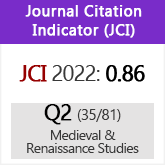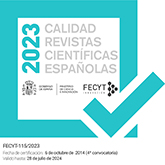Entendre, s’entendre en, entendedor in troubadour lyric
DOI:
https://doi.org/10.3989/aem.2015.45.1.02Keywords:
troubadour lyric, Occitan troubadours, troubadour canso, vocabulary of fin’amor, translation of troubadour songsAbstract
The word entendre, as it appears in troubadour lyric, maintains all the original meanings of the Latin etymon INTENDERE: “to direct towards something”, “to understand”, “to listen”. These meanings (particularly the first two) allow explaining the evolution of this term within the parameters of troubadour poetry, as well as its integration in the specific vocabulary of fin’amor. This development granted the word new meanings related to the reception and understanding of the song, to the creative process, and to the rapport between creation and love. Amid this combination of meanings, entendre is incorporated into the group of words and expressions used to define courtship and the pertinent creative process. Its derivative entendedor became a word for the lady’s suitor; the works of Bernart de Ventadorn, Raimbaut d’Aurenga and Giraut de Bornelh are crucial in this process.
Downloads
References
Appel, Carl (ed.) (1882), Das Leben und die Lieder des Trobadors Peire Rogier, Berlín, Druk und Verlag von G. Reimer.
Beretta, Margherita (ed.) (1978), Berenguer de Palol, Módena, Stem-Mucchi. Boutière, Jean; Schutz, Alexander Herman (1964), Biographies des troubadours. Textes provençaux des XIIIe et XIVe siècles, París, Nizet.
Coromines, Joan (1992), Diccionari etimològic i complementari de la llengua catalana, Barcelona, Curial edicions - La Caixa.
Cropp, Glynnis, M. (1975), Le vocabulaire courtois des troubadours de l’époque classique, Ginebra, Droz.
Fratta, Aniello (ed.) (1996), Peire d’Alvernhe. Poesie, Manziana, Vecchiarelli Editore.
Gaunt, Simon; Harvey, Ruth; Paterson, Linda (2000), Marcabru. A critical edition, Cambridge, D.S. Brewer.
Jeanroy, Alfred (ed.) (1957), Jongleurs et troubadours gascons des XIIe et XIIIe siècles, París, Champion.
Lazar, Moshé (ed.) (1966), Bernard de Ventadour, troubadour du XIIe siècle. Chansons d’amour, París, Klincksieck.
Levy, Emil (1902), Provenzalisches Supplement-Wörterbuch, Leipzig, O. R. Reisland.
Levy, Emil (1973), Petit dictionnaire provençal-français, Heidelberg, Carl Winter.
Marshall, John Henry (ed.) (1972), The Razos de trobar of Raimon Vidal and associated texts, Londres, Oxford University Press.
Meyer-Lübke, Wilhelm (1992), Romanisches etymologisches Wörterbuch 1861-1936, Heidelberg, Carl Winters Universitätsbuchandlungen.
Milone, Luigi (ed.) (1998), El trobar “envers” de Raimbaut d’Aurenga, Barcelona, Columna.
Monson, Alfred (1987), Trobar et entendre dans les vidas des troubadours, en Atti del Secondo Congresso Internazionale della Association Internationale d’Etudes Occitanes, Turín, Universidad de Turín, Dipartimento di Scienze Letterarie e Filologiche, vol. I, pp. 255-268.
Pasero, Nicolò (ed.) (1973), Guglielmo IX d’Aquitania. Poesie, Módena, Stem-Mucchi.
Pillet, Alfred; Carstens, Henry (1933), Bibliographie der Troubadours, Halle, Max Niemeyer.
Raynouard, François-Just-Marie (1842), Lexique roman ou dictionnaire de la langue des troubadours, Heidelberg, Carl Winters Universitätsbuchandlungen.
Schutz, Alexander Herman (1932), A preliminary study of trobar e entendre, an expression in mediaeval aesthetics, “Romanic Review” 23, pp. 129-131.
Schutz, Alexander Herman (1935), More on trobar e entendre, “Romanic Review” 26, pp. 29-31.
Sharman, Ruth Verity (ed.) (1989), The cansos and sirventes of the troubadour Giraut de Borneil: a critical edition, Cambridge, Cambridge University Press.
Tobler, Adolf; Lommatzsch, Erhard (1925-1995), Altfranzösisches Wörterbuch, Stuttgart, Franz Steiner Verlag Wiesbaden.
Wartburg, Walther von (1974), Französisches Etymologisches Wörterbuch, Basilea, Zbinden Druck und Verlag.3
Downloads
Published
How to Cite
Issue
Section
License
Copyright (c) 2015 Consejo Superior de Investigaciones Científicas (CSIC)

This work is licensed under a Creative Commons Attribution 4.0 International License.
© CSIC. Manuscripts published in both the printed and online versions of this Journal are the property of Consejo Superior de Investigaciones Científicas, and quoting this source is a requirement for any partial or full reproduction.All contents of this electronic edition, except where otherwise noted, are distributed under a “Creative Commons Attribution 4.0 International” (CC BY 4.0) License. You may read here the basic information and the legal text of the license. The indication of the CC BY 4.0 License must be expressly stated in this way when necessary.
Self-archiving in repositories, personal webpages or similar, of any version other than the published by the Editor, is not allowed.















